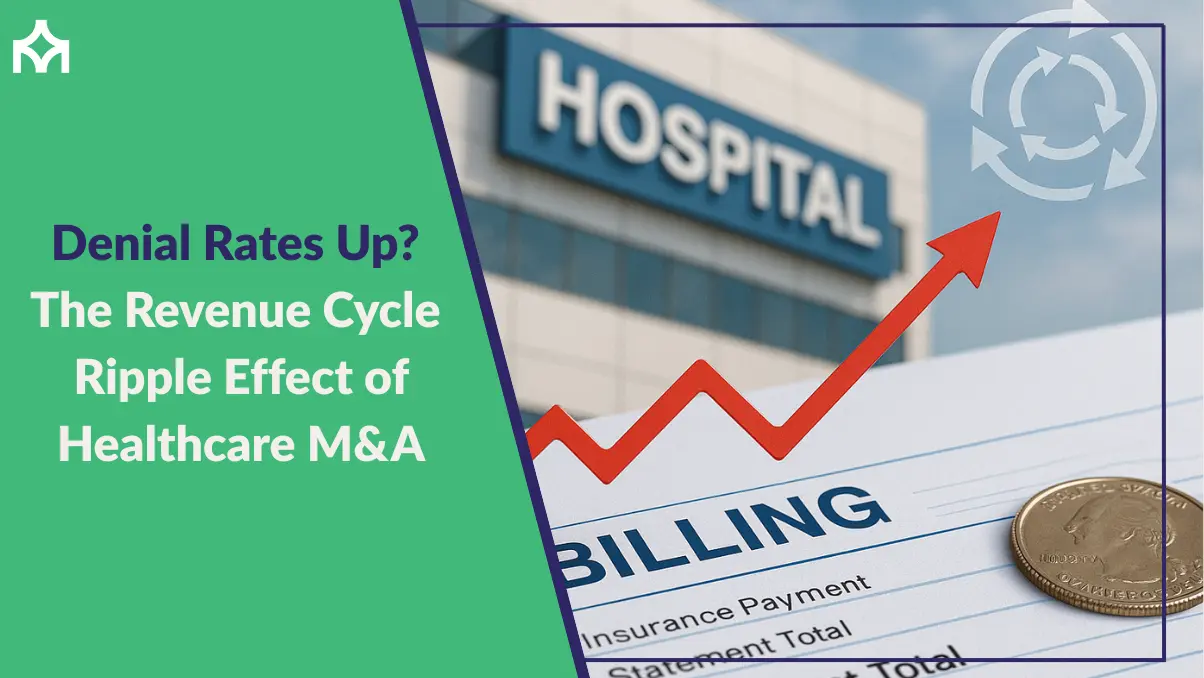In 2025, the U.S. healthcare sector finds itself at a critical inflection point. On one hand, mergers and acquisitions (M&A) are accelerating at an unprecedented pace as providers seek to scale, survive, and gain a competitive advantage. On the other hand, claim denial rates are soaring, costing hospitals billions and placing an enormous strain on revenue cycle operations. What many healthcare leaders are beginning to realize is that these two trends are deeply intertwined, and the financial risks of ignoring their intersection can be devastating.
The Denial Surge
The numbers are alarming:
- 1 in 5 medical claims are denied on primary submission
- Over 19% of in-network and 37% of out-of-network claims face rejection
- 57% of RCM leaders reported denial rates exceeding 10% in 2023, nearly double the pre-pandemic average
- Medicare Advantage denials rose by 56%, and commercial plan denials jumped 20% in just two years
- $19.7 billion is the annual cost hospitals incur trying to appeal or overturn denied claims
- 22% of providers lose $500,000+ each year in unrecouped denials
Why Integration Is a Double-Edged Sword
Over the past five years, the industry has averaged over 250 hospital mergers annually, with over 65% of providers expecting more M&A activity in the near term. While consolidation promises efficiencies, it’s increasingly clear that without RCM alignment, the merger itself can be a denial accelerator.
How M&A Impacts the Revenue Cycle:
| M&A Driver | Revenue Cycle Impact | Example |
|---|---|---|
| IT System Integration | Claim errors, payment delays | 1 in 5 claims are denied on the first submission |
| Contract Misalignment | In-network denials, cash flow disruption | 19% of in-network claims denied |
| Centralized Billing/Outsourcing | Temporary denial spikes due to staff turnover | 57% of RCM leaders see denial rates >10% |
| Staff Learning Curve | Errors in coding and documentation | $19.7B/year spent appealing denials |
| Loss of Visibility | Missed denial patterns and payer behavior trends | Denials up 20% YoY, largely preventable |
Why Denials Are Rising in a Post-M&A World
Several systemic factors compound the denial risk during and after M&A:
- Stricter Payer Policies & AI Audits
Payers are increasingly relying on AI to scan for documentation gaps, overutilization, and coding inconsistencies. In a post-M&A environment with systems still being aligned, the margin for error skyrockets. - Fragmented Workflows
M&A often merges entities that use different EHRs, billing platforms, and payer contracts. This lack of uniformity leads to delayed authorizations, coding mismatches, and claim submission errors. - Staff Disruption
The inevitable turnover and restructuring that follow an acquisition interrupt workflow continuity. Staff unfamiliar with new platforms or processes may unintentionally cause billing inaccuracies that lead to preventable denials. - Delayed Contract Reconciliation
Hospitals often wait months, sometimes years, to harmonize fee schedules and payer terms. During this limbo, claims may be submitted under outdated or incorrect agreements.
The Financial Fallout: Denials Compound Over Time
Let’s be clear, denial rates don’t just impact revenue in the short term. Left unaddressed, they lead to:
- Lower cash flow and liquidity stress
- Increased write-offs and bad debt
- Poor patient satisfaction due to unclear billing or refund delays
- Regulatory exposure from inconsistent billing practices
What Forward-Looking Health Systems Are Doing Presently
Leading organizations are not sitting still. They’re implementing a strategic, technology-driven response to offset denial risk before, during, and after M&A:
- ✔ Pre-Merger RCM Assessment
Audit both organizations’ revenue cycle infrastructure, payer contracts, and coding practices. Identify redundancies, weak links, and opportunities to harmonize. - ✔ Unified Denial Management Platform
Consolidate denial tracking, claim appeals, and payer communications into a single dashboard. A 360-degree perspective of vulnerabilities is offered by real-time analytics. - ✔ AI-Powered Predictive Analytics
Flag at-risk claims before submission. Automation tools are being deployed to ensure pre-checks on eligibility, prior authorization, and documentation. - ✔ Invest in Workforce Resilience
Upskill existing teams and provide clear onboarding for new staff navigating integrated systems. Documentation audits and refresher training can dramatically reduce errors.
Case in Point: MGA's Role in Resilient Revenue Cycle Transformation
At Modality Global Advisors (MGA), we specialize in helping healthcare organizations navigate the RCM risks associated with growth and consolidation. Our services empower health systems to:
- Reduce preventable denials by up to 30%
- Integrate RCM systems post-M&A for full visibility
- Strengthen payer negotiation through clean data
- Train frontline teams to manage and mitigate denial patterns in real time
MGA’s approach is data-driven, tech-powered, and clinically informed, making us a trusted partner for hospitals aiming to future-proof their revenue operations in the age of consolidation.
The Bottom Line: You Can’t Afford to Ignore the Ripple
M&A are not slowing down, and neither are claim denials. If your organization isn’t aligning revenue cycle strategy with growth planning, the ripple effect could become a tidal wave washing away margins, patient trust, and long-term sustainability.
The best time to modernize your RCM is before the first claim is denied under your new structure.

